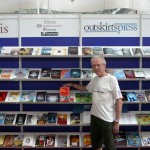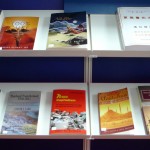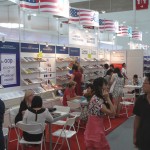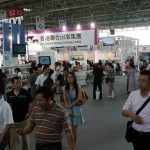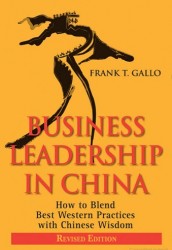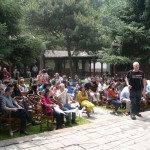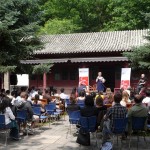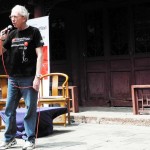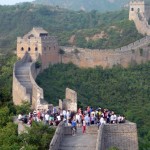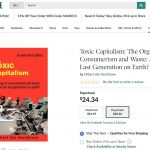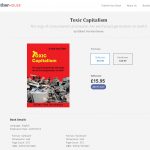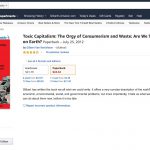My most feared book critic Valerie
I simply copy here with few cosmetic changes my daughter Valerie’s review of my book “Toxic Capitalism”. She can be a sharp-tongued critic and does not mince words. I had made a first attempt to design the book cover and she promptly disapproved. I said, “Any better idea?” Two days later she gave me her design. I was immediately convinced and nothing was changed, the cover as it is today is all hers (I took the picture). Here it is!
Valerie comments
For several years now, my dad had been working on a so-called book. From time to time my mother and I would ask him if he was finally close to finishing “something” (anything), and for the first few years, his consistent response was that he was still “gathering material.”
We’d shake our heads.
One year he finally started to write something. Along the way, he announced to his confused daughter and wife that he was actually writing a “different book” than the one he had set out to at first.
Well, whatever makes you happy, we thought. And somewhere at the back of our minds, we were dreading that when (if) he finally did release a book, it would get us into so much trouble with the Chinese Government (whose over-sensitivity to criticism had already led several prominent Chinese dissidents to flee the country), that we’d get kicked straight out of China (We kind of did not want that. Despite all the problems in China right now, we do consider it our home).
The book is on its way! Panic!
Out of the blue, he announced one day that his book will be published within a few months. There was a deadline now.
Panic!
So one Saturday morning, I found myself staring at the cover I helped design and “Photoshop”, thinking “Well, the cover doesn’t look too bad does it?”
Thus I started reading the book.
I admit. The first few pages of the book made me wince. My father is very passionate about his beliefs and isn’t afraid to voice them, and this was evident in those few pages. However, if the rest of the book maintained this tone, any reader would feel burned out quite quickly. And we’d find ourselves thrown out of the country.
Fortunately, those pages were a mere condensed introduction. A few pages later I found the book to be a considerably more enjoyable read. Three days later, I had devoured the entire book.
What the book talks about
At its core, this book is about fairness. It starts with consumers.
Consumers nowadays splurge on cheap jeans, cheap electronics and even cheap jewels that they buy in large quantities but often throw away within a few months. In the meantime, however, the Earth and workers are paying the real price as the extraction of raw materials cause widespread environmental damage, and toxic chemicals cripple workers for life. This is a cost that is not reflected in the price tags.
My father calls on us all to better appreciate the value of all that goes into the products we so casually throw away. To this end he deploys a veritable encyclopedia of information that takes us around the world, from China’s now insatiable quest to mine out the world resources, to the workshops where workers suffer from unsafe chemicals, to the mountains of landfills building up, and finally to sales in Western countries, whose newfound over-reliance on cheap but poor quality products has become the main driver of this Toxic Capitalism. Along the way he brings us through contaminated waters, clouds of pollution, and through hilarious examples of waste at our very own home.
Worse, we end up all paying the price for this race to the bottom. While we insist on ever cheaper and more discardable products, workers are underpaid and of course under-trained. Product quality declines to a point where even if you want to, you can no longer find quality products. Product maintenance jobs vanish (no wonder unemployment is growing!), as it becomes cheaper to replace a product than to repair it, but the consumers end up paying for it in the long term when they have to replace the products year after year. In the meantime, resources get depleted, air gets polluted, water gets contaminated, food ends up poisoned, and everybody’s health goes to hell. Are consumers any happier?
A call for help to save our planet
This book calls for fairness. Consumers should pay the fair price for their products, instead of letting others assume trillions in hidden environmental and health costs. This in return calls for two things: better products and a return of better services. Instead of buying and throwing and buying and throwing, he calls to a return to the days when people bought quality products, then called a repairman when needed (service jobs that cannot be outsourced!) It also calls on fairer financial institutions and governments: companies should compensate their workers fairly instead of paying fortunes to executives for driving the company and workers to the ground. Governments all around the world should have more flexible labor laws and taxation systems that will force the rich to pay their due, but also allow small and medium companies to thrive.
His precise use of figures will no doubt delight academics, journalists and policy makers, who will find in this book a veritable treasure trove of information that my father carefully built up over a decade. To my surprise, I found the precise use of information to be a welcome change from the fudge and obfuscation the politicized media thrives on nowadays, taking information out of context while never explaining methodology. At the same time, this information did not feel overbearing. It could be shocking, appalling, even amusing, but never boring. Such is the result of careful use of information in context.
At the very beginning of the book, my father noted that during his generation, people brought back milk bottles for refill, that households would have only one TV, for which they’d find a repairman if it ever needed fixing. Vegetables were seasonal, and water didn’t need to be bottled then flown in from the other side of the world.
The current rate of consumerism is not sustainable. He calls to a return to those fairer times (or rather, the establishment of a brand new fair system), and for this generation to no longer consume as though it were the last generation on Earth, so that it may leave a better world for its children.
Conclusion
As you have guessed by now, I was quite apprehensive when I started reading this book, the first my father has ever written. But now that I have finished reading it, I can say that I’m proud of you dad. Your book wholly reflects the knowledge you have accumulated in over a decade of closely monitoring the progress (decline?) of the world, and is well worth the read. It also made me want to go out and find some expensive but good quality products. Good job!
